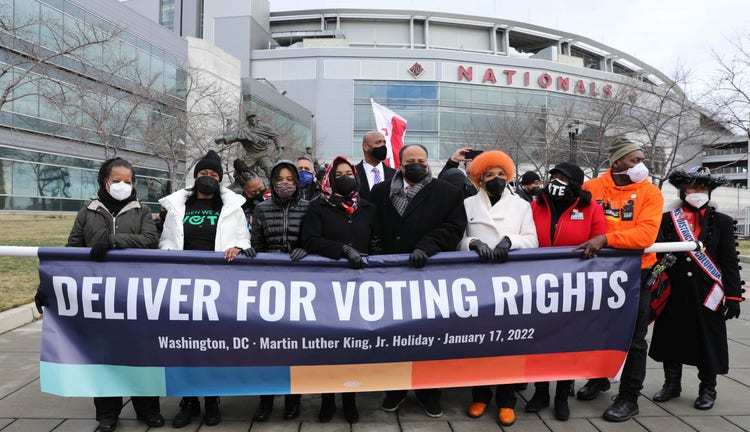
The family of Rev. Martin Luther King Jr. celebrated his legacy on Monday (Jan. 17) with their annual memorial march in Washington, D.C. This year, however, the demonstration was geared toward urging Congress to pass new voting rights legislation.
According to Reuters, King’s descendants and more than 100 national and local civil rights organizations participated in the march across the Frederick Douglass Memorial Bridge. During the march, King’s son, Martin Luther King III; noted the bridge while praising congressional Democrats for passing a $1.2 trillion infrastructure bill last year.
“You were successful with infrastructure, which was a great thing,” King said to the crowd of demonstrators. “But we need you to use that same energy to ensure that all Americans have the unencumbered right to vote.”
The proposed Freedom to Vote: John R. Lewis Act was passed in the House of Representatives last week. The voting rights legislation is set to be considered in the Senate on Tuesday (Jan. 18). Some Democrats, including President Joe Biden, have pushed to end the filibuster so that Republican opponents will not be able to stall the legislation. However, Democrats lacked the votes to end the filibuster, with Democratic Sens. Joe Manchin III and Kyrsten Sinema saying they were against changing the filibuster rules last week.
The Senate is currently split 50-50. Senate Majority Leader Charles E. Schumer previously said he could open a debate about the Freedom to Vote: John R. Lewis Act with a simple majority of 51 votes. However, unless the filibuster rules are changed, 60 votes would still be needed to end the debate and move to vote on the bill.
The legislation has been met with united opposition from Republicans, who, in turn, have passed voting restrictions in several states since Former President Donald Trump falsely claimed the 2020 presidential election was stolen from him. Restrictions have included new ID requirements and limiting early and mail-in voting, which Republicans claim will prevent voter fraud, but Democrats say will suppress the vote.
Conversely, the John R. Lewis Voting Act would increase access to mail-in voting, tighten campaign finance rules and expand federal oversight of elections in states with histories of racial discrimination. The legislation would also create national standards for voting IDs, registration and early and mail-in voting; and make Election Day a federal holiday.